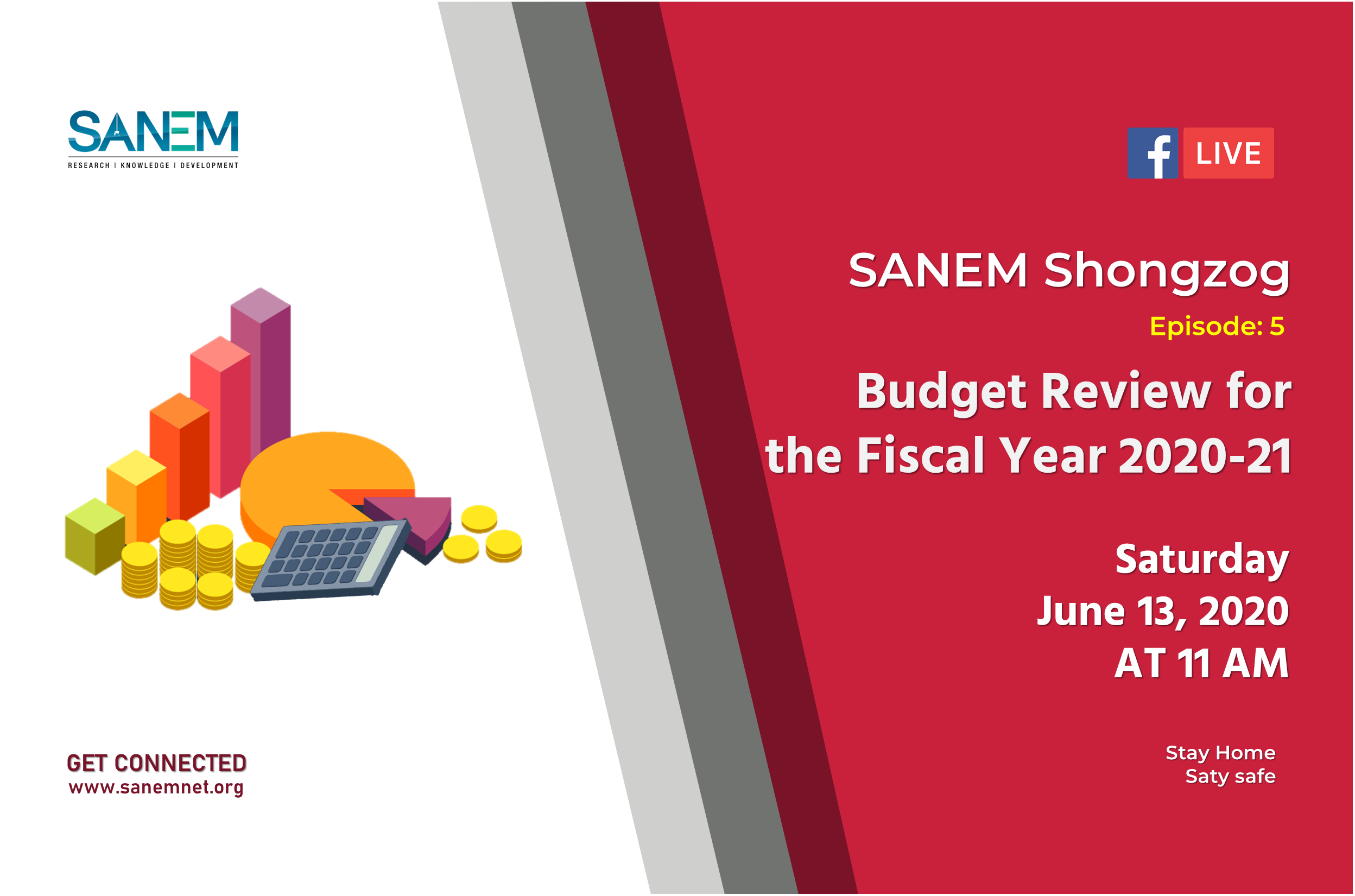SANEM Shongzog | Episode 5
SANEM’s Budget Review for the Fiscal Year 2020-21
13 June, 2020

In a webinar held today, South Asian Network on Economic Modeling (SANEM) delivered its reaction to the proposed budget for the fiscal year 2020-21 on June 13, 2020. Led by SANEM’s Executive Director and Professor of Economics at University of Dhaka, Dr. Selim Raihan, the expert panel included Dr. Sayema Haque Bidisha, Professor, Department of Economics, University of Dhaka and Research Director, SANEM, Mr. Mahtab Uddin, Lecturer, Department of Economics, University of Dhaka and Research Fellow, SANEM, and Ms. Eshrat Sharmin, Research Associate, SANEM. Around 70 participants including economists, professionals, development practitioners, researchers, journalists, and students joined the webinar through the video conferencing app ZOOM.
In his introductory remarks, Dr. Raihan acknowledged the challenges of designing a budget in the current context of COVID-19. However, he said that the proposed budget is not COVID-19 responsive to the extent that it was required to be. It has followed a rather traditional way and therefore is not in line with the extraordinary demands of the current situation. He also said that while it is commendable that allocation in health, education, agriculture, and social protection has been increased, it is not enough to meet the challenges of the crises induced by the pandemic. Given the past record, there is reason to be skeptical about the proper implementation of the budget. In that regard, regular updates on the implementation of these allocations, especially in the case of the health sector, should be given. Also, a high-powered expert committee might be able to make proper utilization of the increased allocation for the health sector. While the budget does not address the mismanagement, corruption, and institutional weaknesses existing in the health sector, availability and accessibility of COVID-19 vaccines have also been left out of the discussion. Dr. Raihan said, certain provisions in the budget indicate inconsistencies in facts and data; this should be dealt with cautiously as incorrect assessment can lead to overconfidence and wrong policy choice. The newly poor have not been addressed in the budget and in this regard measures like cash assistance, food distribution and unemployment benefits should have been incorporated. Referring to the whitening of the black money, Dr. Raihan said that while this measure has not been effective in the past, it discourages honest people. Also, whether such provisions are in line with the constitution is a question. He further explained that the budget focuses on the RMG sector too much and other export-oriented sectors have not been given importance in the same manner. Reflecting on the crises of the banking sector, Dr. Raihan remarked that the banking sector faces the pressure of partially financing both the stimulus packages and the budget.
Whether the crises ridden sector is up to this task is a question and the budget should have had recommendations regarding the challenges of this https://asahiramen.com/ativan-for-sale/ sector. Given the nature of the current situation, increasing budget deficit will not be a problem, however, for financing, it must be realized that the revenue target is unrealistic and therefore it is necessary that Bangladesh enters into negotiation with World Bank, IMF, and other international organizations for loans with low interest and flexible conditions. Cutting finance of unnecessary megaprojects is also a necessity in this regard. Dr. Raihan also said that SANEM has been proposing delaying of Bangladesh’s LDC graduation by three years as post-LDC graduation; Bangladesh will lose preferences which might be detrimental in the face of upcoming economic challenges. Reemphasizing the necessity of a recovery plan, Dr. Raihan pointed out that political will has been reflected in the budget but whether it will be transformed into action is the question. Discussing the shock to remittance flow Dr. Raihan said it is a possibility that as soon as international flights commence Bangladeshi immigrant workers might be sent back home, in the same fashion as in the time of the Gulf War of 1991.
Dr. Sayema Haque Bidisha said that the budget does not address the floating urban poor and the measures taken for youth and SMEs is not enough. Bureaucratic complications often stand in the way of these measures, which should be taken into consideration. She said that despite incentives and stimulus packages for the RMG sector, workers have been laid off. The budget does not contain specific and definite measures for women, especially for those distressed by the current crisis. Strong measures for tackling increasing domestic violence, have not been considered in the budget. Given the newly emerged situation, incentive, and stimulus for online businesses and facilitation of mobile usage was important. However, she remarked, that the budget stands in contradiction to that. Training and workshop programmes for enhancing skills should have been given more importance, she said. However, it is appreciated that the fourth industrial revolution and nanotechnology have been addressed in the budget. Provisions for employment for disabled people could have been incorporated in the budget. Dr. Bidisha also said that national austerity measures, cutting allowances of top officials and unnecessary costs, could have been introduced in the budget, which could be essentially beneficial for financing.
Explaining the economic impacts of the pandemic on the education of middle-income and low-income families, Mr. Mahtab Uddin remarked that after the pandemic, there might be a rise in drop-out rate. Child marriage can also increase. Delay in the graduation of university students can have life-long impacts for them. If enrollment in school decreases, it will also have a generational impact. These concerns have not been reflected in the budget. The pandemic has created new challenges in the education sector and budget allocation reflects traditional thinking which cannot address these challenges.
Ms. Eshrat Sharmin said that there should be stricter measures for black money. The budget should have had more focus on integrating repatriating workers in the domestic economy.

